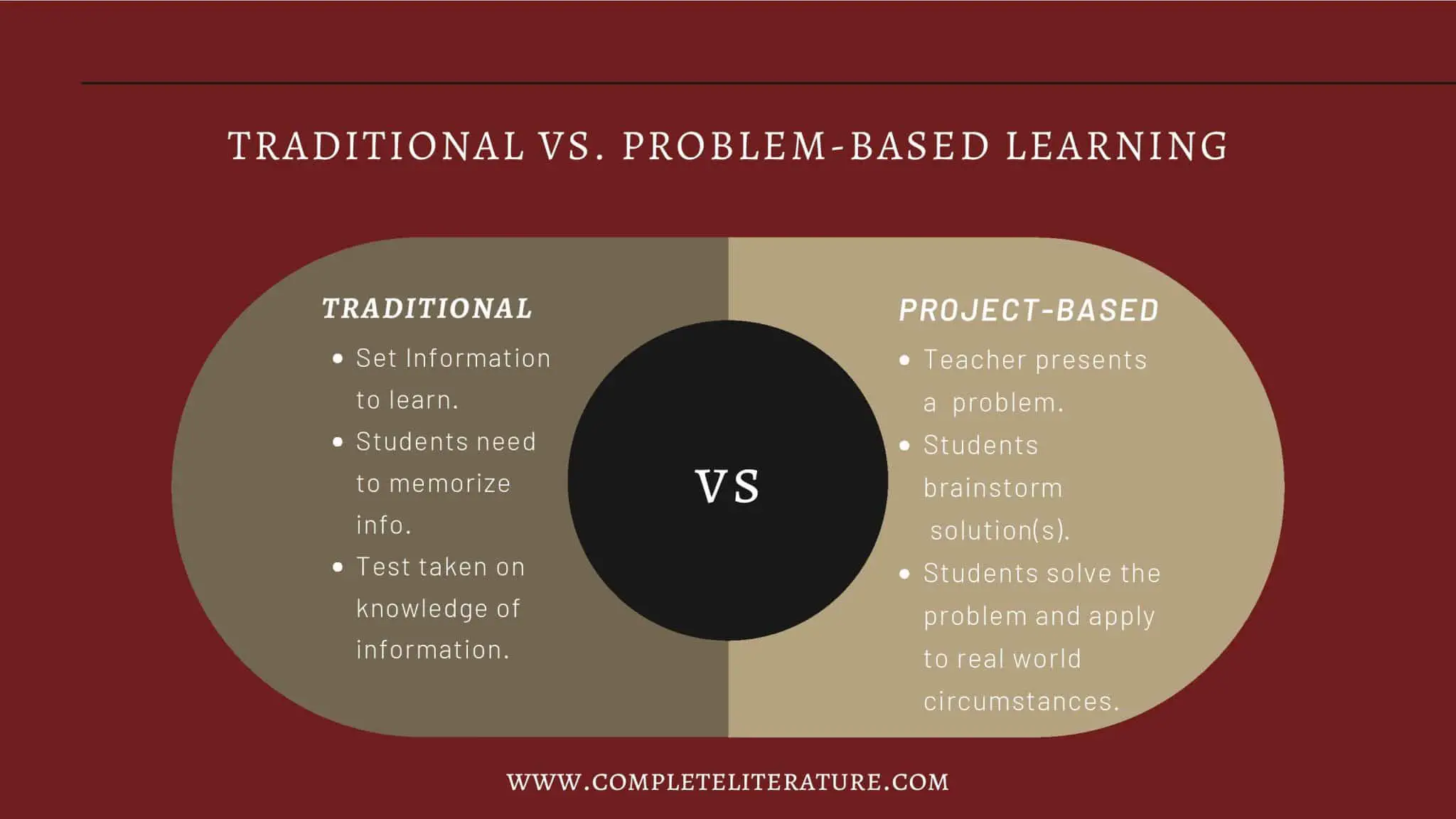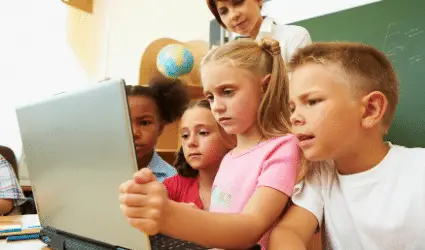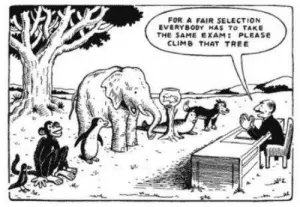Problem-based learning may be one of the best techniques to teach your students how to live and thrive once they get out of the classroom and into the real world.
So what is problem-based learning and how does it boost your students’ success in the real world? Problem-based learning is introducing your class to a real-life problem and then working through it to a valid solution (or solutions if there is more than one). It does a great job boosting your students success in the real world because it is teaching them actual real world situations–before they are in the real world and making these sometimes critical decisions.

I researched the concept of problem-based learning and its advantages and disadvantages in the classroom. In this article I will show you what I learned and how this has worked in my own experience as well as today’s classroom as related to the world we find ourselves in today.
But first I would like to talk about the differences between traditional learning and problem based learning. Here is a chart to summarize the differences:

Traditional learning certainly has its place in education and we all use it every day. But problem-based learning allows the students to directly apply what they are learning to real life. And it’s kind of exciting when you see them work through it and realize that they just solved a real-world problem, mostly on their own. This is what school should be teaching its students. Schools are supposed to be preparing students for the world they are about to enter.
Ok, so now let’s take a look at the components of problem-based learning, what the advantages and disadvantages are in our classrooms.
Table of Contents
What are the Components of Problem-Based Learning?
Here are the seven components of problem-based learning:
- Identify the problem.
- Students collectively gather the knowledge they already have regarding the problem.
- Discuss what the issues are and what they need to find out to solve the problem.
- Research the issues and possible solutions to the problem.
- Formulate and test any and all possible solutions.
- Present the valid solution(s) they came up with.
- Evaluate the process and their performance throughout.
Who is Doing Problem-based Learning?
I would like to note that problem-based learning is predominantly being done at the university level. And so far it has great reviews, both among students and teachers. But what if we were using this at the middle school level? While the existing knowledge base of middle school students would be significantly less than the students at the university level, they would be able to pick up significant knowledge in the research stage.
The huge benefit of implementing this in the early stages of education is that students will not be as fearful of working through the process and making a critically wrong decision. They are still very much in the discovery phase. And this will allow them to proceed with the new process without nearly as much hesitation of an adult student.
As a result of this, many middle schools are now starting to catch on to problem-based learning and teachers and students alike are loving it.
What are the Advantages of Problem-based Learning?
The biggest and most obvious advantage to using problem based learning in the classroom is that it is directly teaching students how to problem solve using real world research and circumstances. And one of the most rewarding things for teachers and parents is when the kids actually do use these concepts in their life outside of school–and succeed with it!
But this isn’t the only advantage. There are several more. I will talk about a few of them.
Students Learn to Work With Others
This is such a good skill to teach students because very few of them will go on to work at their job all by themselves. We are always working with other people, whether it is other family members, friends, social or church groups, or work groups. Learning the ins and outs of working with others is a critical skill. And it needs to be learned earlier than later.
Students Are Taught How to Conduct Research
This is a great way for them to learn to conduct research because the stakes aren’t as high as in real life. And if they become comfortable with the process at an early age, how much more prepared will they be when they do have to make some high stakes decisions in life?
Also, because they are seeing the way other students are solving problems, they will have inspiration on how others do things that they had not thought of.
Students Learn to Combine Seemingly Different Parts of Life or Subjects Together
When we are younger we tend to think of things in very linear terms. So doing exercises like this in the classroom is a great way to expand your students’ world. They will see how history, geography, math, grammar, and all of the other subjects intertwine in life. And they will see how things they are learning in the classroom can easily translate to life outside of the classroom. There is a video at the end of this article that shows just how students used problem-based learning in their classrooms to help out their community.
This is prime education!
Students are Taught Leadership Skills
Giving students enough control in the classroom to talk about what they know and what direction they want to take their learning in is a great way for students to not feel like they need to be spoon fed their education. While they may be a little nervous about it at first, when they see abilities they never realized they had, it will inspire them to keep on going and grow in their knowledge and experiences.
This will enable them to slip into leadership positions that they would not have even thought about before. It will make them into thinking people.
They Will Retain What They Have Learned Much Longer
Just about everybody learns better experientially than they do just listening to another person talking to them. The more senses that are involved in learning, the better people are able to remember what they have heard/experienced.
In addition to this fact, the various steps involved in problem-based learning actually build on the knowledge base with each exercise enhancing the previous one.
By the time students are done with each concept they have learned in the process, they have truly cemented what they have learned through that unit. And they will be able to repeat that knowledge for years to come.
What are the Disadvantages of Problem-based Learning?
Many of the perceived disadvantages of problem-based learning actually disappear once the process is fully evaluated. But here are a few of the ones that I found voiced most often.
It Could Take More Planning Time Initially
This is true if your school or classroom is newly implementing this learning strategy. It would take more time to research and prepare lessons based on this new model.
But once that initial work is done, you will actually be saving time in the long run because you aren’t preparing and looking for material to present to the students. Instead, you are guiding them to do that research on their own. And that, in turn, will teach them to go find out any information they will ever need!
Sometimes Having Students Work in Groups Can Get Tricky
This one may be the one disadvantage that I agree with the most. I used to hate working in groups because the more advanced students always did all of the work while the less motivated students sat back and collected the good grades.
Group study has come a long way since those days. Most teachers are watching what is going on and by the time they are assigning groups and evaluating the work being done, they can pretty easily identify the trademarks of their students’ work. And for anything they are unsure of, a few questions will quickly show the teacher who is doing what work.
Just make sure that you are assigning groups well and that you are open to your students reasonable concerns regarding them.
Lack of Prior Learning Can Leave Some Students at a Disadvantage
You are definitely going to have some students that have a much larger knowledge base than others. But the point here isn’t who has the most knowledge. It is how they can evaluate their level of knowledge, recognize what knowledge they will need to pursue, and formulate their research based on that.
Working in groups will actually help them see how others work through this process. And all of the students will be inspired by other students’ methods and thought processes.
This actually expands their experience even more.
Harder to Grade With an Exact Score
This one is very true if you are looking to evaluate your students with written tests and percentages. But generally speaking, that is not the way the real world works. Once you graduate from school, except for a few disciplines that require ongoing knowledge, you are not going to be tested in this way.
So if the goal of school is to prepare students for life, this isn’t really a disadvantage.
This does not mean that I believe we should throw out standardized testing, written tests based on information they have learned, or math tests! Sorry, Kids!
The only other possible disadvantage I ran across was that different teachers would evaluate the same work in different ways. That is actually true, but also true as you get into the older grades and university-level education. As long as you have different people with different brains, that will always be an issue. So I guess my answer to this is that students should always do the best that they can and that will carry them a long way through the process. Which actually sounds a lot like real life too.
Conclusion
So this is problem-based learning in a very small nutshell. There are some excellent books that have been written that go into way better detail than I have. Here are a couple that really worked for me:
Problem-Based Learning: An Inquiry Approach
Everyday Problem-Based Learning: Quick Projects to Build Problem-Solving Fluency
Problem-Based Learning in the Physical Science Classroom, K-12
And finally, here is an excellent (and very short) video that the Two Rivers Public Charter School did explaining how they implemented this concept from grades K-8 and the incredible results it produced in their school and community. Please take just a couple of minutes to watch it.
So what has been your experience with problem-based learning? Have your kids done it at their school? Or are you a teacher that has some experience with it? Or did you have this form of learning when you were in school yourself? I would love to hear what you thought of your experiences.
Also, if you liked this article, I think you will also like these related articles:
Helpful Examples of Differentiated Instruction
Seven Styles of Learning and How They Apply to Your Students





I like that this type of learning can produce or develop a more critical mind in our children.
I like problem based learning. I can see this working well with my youngest son
Let me know how it goes, Tara!
I love problem solving activities back in my grade school days. I agree to this kind of learning.
These are some great skills to learn. I am all about problem based learning. I think it’s important for kids to learn how to work with one another.
Yes, Amber! Because no matter what they end up doing as adults they will be working with other people. Learning these skills early is only beneficial.
I really love this type of learning and I appreciate you sharing this with us. I think my nephew would thrive with this.
Most kids do thrive with this in many different ways. And I do see a lot of schools starting to pick up on this in my research.
In BC, Canada we have just changed the Grade 11 and Grade 12 curriculum to include more problem based learning. Students are in cohorts and are given a challenge to solve and they incorporate ideas from all the different disciplines. It’s really a great way to learn!
That is awesome to hear! I know the kids will love it and it will do them so much good.
I LOVE the practical application of problem-based learning, encouraging these children to develop the skills necessary to tackle real-life solutions that they will face later in their lives.
I’m all for problem solving learning. I know I studied ‘Critical Thinking” in college but why wait that long?
Exactly, Cindy. The sooner kids start learning this stuff, the better off they are in life, even at an early age.
Problem based learning clears up the concept and allows the student to remember the details for a longer period of time.
I like the idea of program based learning. They’re not only great life skills to learn but help massively with problem solving.
This is a wonderful approach to learning. Times are changing and education needs to change with it. We need to move from spoon-feeding students information which they need to learn like robots to something like Problem-Based Learning. Great article.
Thank you, Cristina. And yes, as times and our world change, we need to make sure the way we are preparing our kids changes as well.
I try to do teaching in the style of problem-based learning depending on the kids. I teach ESL kids as well as preschool and it always depend on their language ability (the kids I teach are Japanese who can speak and come to learn English).
That is perfect! They will love what you do for them. And they will be excited to come back to class to see what you have planned!
Great ideas! I think learning would have been easier for me if my teachers followed your tips
That would have been awesome, Lyosha. I have gotten a lot of my inspiration from some really good teachers I had growing up–and lots of dreams of students I had. 🙂
These tips are such great ideas in this day and age when everything is done for convenience and everyone wants instant results.
I wasn’t introduced to problem based learning until college. I am glad to see that primary and secondary schools are teaching this method now.
This curriculum sounds amazing for kids. Problem solving is a more fun and interactive way for kids to learn. I am sure many school will soon get on this.
I hope so, Rupal!
Love this, and love that two of the benefits are learning to work with others and taught leadership skills.
Those are a couple of my favorites too, Amber. Thank you for your thoughts.
I like the sound of problem-based learning! It means teaching students something that they can use their whole lives.
Exactly!
This is such a great approach to learning. There are so many useless things that children learn in school, things that they will never use in real life.
Very true, Joanna. I love how this relates directly to daily life!
This is a great way to help kids learn how to solve problems or at least look for Solutions or probably solutions to problems.
I have always thought learning through real world experiences to be far more important than what’s taught in school!
This is so neat, thanks for sharing this. such good info!!!!
I think Problem-Based Learning is a good strategy for kids to learn. They become more analytical and practical. They become more mature.
Real world skills are so important. Perfect timing during pandemic!
problem-based learning is a great approach. I agree that it’s a great way to teach students to work with others. That is a great skill to learn.
Very true. That is a skill they will need for a lifetime, no matter what field they go into.
This is the type of education I would have enjoy as a kid. It prepares beter for real life.
I agree. We all could have done well with this. I had a couple of teachers that actually did work this way.
i had never heard of this method but it sounds fabulous. my only question is how could a teacher enforce this method when teaching over 20+ kids.
Small groups, teacher assistants, parent helpers, student helpers, large group projects. There are even more ways than this! Thank you for sharing your thoughts.
I actually wrote my bachelor’s and master’s thesis about problem-based learning. My teachers did not use this method when I was at school, but I did use it with my students as often as possible. The kids loved it.
That is awesome, Ave! I agree, the kids love it when they feel like your program is suited well for them and their growth and learning and not just information being thrown at them. You are an amazing teacher. ♥
Yes! What a great article. Problem based learning and hands on learning I think are the best ways students learn. I just also wish that a lot of the higher education (high school and up here in the states) taught more personal finance problem based learning. It would help a lot of people in this country.
It certainly would help students get on their feet and make wise financial decisions before they get into a rut, wouldn’t it. Wonderful idea. Thank you for sharing, Margaret!
I think this is great thought. This method makes our child brave. They will able to face any problems in the life
Very true, Sophia! And they won’t be as scared because they will understand the world more and won’t feel like they are being thrown into it unprepared!
Excellent, even I am in favour of this concept of learning. Practically watch things with your eyes, experience the scenario, understand the problems, solve it yourself and execute it. I have heard of a mom who takes her kids out on the road in many places and in any kind of weather. She teaches them to live life and learn in such a mode.
I love the idea of focusing on problem solving in education, that is what matters most and what would equip our kids for the future.
I love the idea of a problem base learning it helps kids to think deeply, understand the problems and making a solutions on their own.
wow i really love this approach to learning ! i so need to try that on my daughter – kind regards Pati Robins @ style-squeeze.blog
Great to learn that children learn through this method and I am sure they will enjoy it and do more critical thinking and solve issues.
Another interesting piece with different insights on different education methods – thanks for your writing and I do agree critical thinking is of extreme importance for a Child’s growth! – Knycx Journeying
This is great way of learning. My niece will definitely going to love this method. And I am totally in this approach of learning
I also prefer problem-based learning as it develops the student’s analytical skills and bring more challenges to the brain.
You are exactly right!
These are some great tips for how to stay motivated and inspired when applying problem based learning.
Great Work, the specific difference between traditional and problem-based learning and the advantages of problem based learning is supportive for teacher. Keep it up good work.
I always try to do simple problem solving learning with my students (and also critical thinking) as there are only age 3-4. It is so important!
You are right–it is so important. And at 3-4 years of age it is a perfect time to start!
This type of learning will be very helpful for children to develop their thinking skills, this is a nice article thanks for sharing 🙂
This is genius. I’ve often thought that the classroom was severely lacking in the kinds of things that kids will use when they’re adults.
This is exactly the kind of teaching we need in our classrooms. If you only learn specific formulas or ideas but have no way to translate them to the real world, it doesn’t do you much good.
There are so many advantages to learning like this! I think the biggest are learning to work with others and the extra retention because they learned something by doing rather than just straight out of a book.
I am a huge proponent of problem-based learning. It always seems more meaningful to work through or solve something that is “real-world.” Learning at its finest, in my opinion.
I love this approach to education! I think there is so much value in training and teaching more geared towards how the world actually runs. This is extremely helpful!
Kileen
cute & little
A good teacher should be this, one who can help a student for the school and the world to come. Society depends on it, after all there are no bad students but only bad teachers!
It’s definitely important for children to be able to problem-solve in the real world! Goodness knows that we adults have to do a lot of it.
Problem-Based Learning really helps. It equips your child to be ready in the future. They become more responsible and adaptive!
Problem-based learning is particularly useful in helping kids retain info, as you mentioned, and can even be helpful in them teaching material to their peers. I’m sure it helps with critical thinking and analysis as well.
Problem based learning prepare students for the real life challenges that they might confront in the future. I feel a perfect blend of learning is required in the long run.